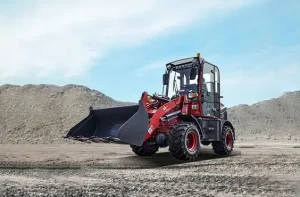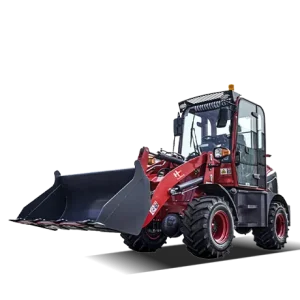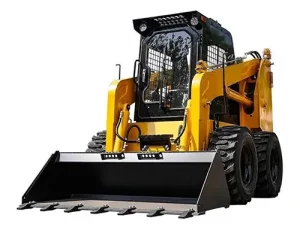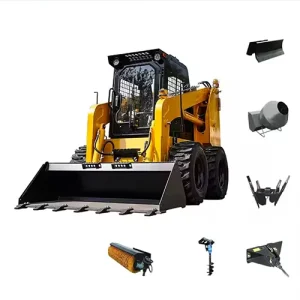Avoid your inquiry is delay response, please enter your WhatsApp/Skype along with the message, so we can contact you at the very first time.
We will reply you within 24 hours. If for urgent case, please add WhatsApp/WeChat: +86 16652801818,. Or call +86 16652801818 directly.
*We respect your confidentiality and all information are protected. We will only use your information to respond to your inquiry and will never send unsolicited emails or promotional messages.
Struggling with muddy sites, delicate turf, or jobs demanding serious pushing power and versatility? Limited access and unstable ground can cripple productivity and inflate costs. You need a machine that goes where others can’t, works harder, and adapts to any task, delivering reliable performance every single day.
A compact track loader (CTL) is a versatile piece of compact equipment featuring rubber tracks instead of wheels, providing exceptional stability, low ground pressure, and superior traction on challenging terrain like mud, sand, or slopes. As manufacturers, we engineer CTLs for power, durability, and unmatched attachment versatility, making them essential for construction, landscaping, agriculture, and rental fleets.

Skid-Loaders
Welcome! As a long-standing manufacturer rooted deeply in the world of construction equipment, we understand what truly matters on the jobsite. We build machines designed not just to function, but to endure. The same principles of strength, reliability, and raw power that go into our largest excavators and dozers are meticulously applied to our line of Compact Track Loaders (CTLs).
We know our customers – the hardworking Construction Contractors managing demanding projects, the dedicated Farmers and Agri Dealers feeding the nation, the meticulous Landscaping and Forestry Companies shaping our environment, the savvy Machinery Rental Companies supplying essential tools, and the vital Government agencies maintaining public infrastructure. You all share common needs: equipment that offers unwavering Durability & Reliability, intuitive Ease of Use & Features, substantial Load Capacity, and a Power System you can count on, shift after shift.
The rise of the compact track loader isn’t accidental. It’s a direct response to the evolving demands of modern work environments. It represents a leap forward in versatility and capability, especially when compared to traditional wheeled machines like the skid steer loader. Let’s dig into why a CTL might be the powerhouse your operation is missing.
At its core, a compact track loader is a type of compact equipment designed for lifting, pushing, and powering various hydraulic attachments. What fundamentally distinguishes it from its close relative, the skid-steer loader, is its dedicated track undercarriage. Instead of four wheels, it utilizes two continuous rubber tracks, similar to a bulldozer but on a much smaller scale.
This tracked system is the key to many of the CTL’s advantages. From our manufacturing perspective, designing a robust and reliable undercarriage is paramount. It involves careful selection of materials, precise engineering of rollers, idlers, and sprockets, and ensuring the track tensioning system is both effective and easy to maintain. This focus ensures the machine can handle the stresses of operating on uneven and often abrasive surfaces.
The result is a machine that provides significantly lower ground pressure compared to a wheeled skid steer of similar size. This means compact track loaders can operate effectively on soft, muddy, or sandy ground where wheeled machines would struggle or cause excessive damage. They also offer exceptional stability, particularly on slopes, enhancing operator confidence and safety.
While both compact track loaders (CTLs) and skid steer loaders share similarities in their general function and ability to use many of the same attachments, their fundamental difference lies in the undercarriage – tracks versus wheels. This leads to distinct performance characteristics:

Terrain Handling: This is the CTL’s home turf. Tracks provide superior traction and flotation on soft, wet, sandy, or uneven terrain. Skid steer loaders perform best on hard, stable surfaces like pavement or compacted gravel. Using a skid steer on soft ground can lead to rutting and getting stuck.
Stability: The longer, wider footprint of the tracks gives CTLs enhanced stability, especially when lifting heavy loads or working on slopes.
Ground Pressure: **Compact track loaders distribute their weight over a larger area, resulting in significantly lower ground pressure. This minimizes damage to sensitive surfaces like lawns or finished landscape areas. A typical CTL might exert 4-6 PSI compared to 25-35 PSI for a similar-sized skid steer.
Maneuverability: Skid steer loaders can typically turn within their own length (“skid” steering), offering excellent maneuverability in extremely tight spaces. While CTLs are also highly maneuverable, their turning can sometimes scuff surfaces more than a skid steer on hard ground due to the tracks.
Speed: Skid steer loaders generally have faster travel speeds than CTLs.
Operating Cost: Historically, the undercarriage of a CTL involved higher maintenance costs than the tires of a skid steer. However, advancements in undercarriage design and materials, like our heavy-duty components and torsion suspension systems, have significantly improved longevity and reduced costs, making the TCO (Total Cost of Ownership) much more competitive.
As manufacturers, we often see customers choose CTLs when dealing frequently with challenging ground conditions or when surface disturbance is a major concern. If most work is on hard surfaces, a skid steer might suffice, but the versatility of the CTL makes it increasingly popular across diverse applications.
The inherent stability, low ground pressure, and attachment versatility of Compact Track Loaders make them suitable for an incredibly wide range of types of jobs. We design these machines knowing they’ll be pushed to their limits in various sectors:
Construction: Perfect for site preparation, grading, backfilling, material handling (bucket work, pallet forks), demolition (with hydraulic breakers), and utility installation (auger attachments) – especially on unimproved sites or in early project phases where ground conditions are poor. Their pushing power is also valuable for initial clearing.
Landscaping & Forestry: Ideal for moving soil, mulch, and rocks; planting trees (auger); installing hardscapes; clearing brush (rotary cutters, grapple attachments); and general landscape maintenance. The low ground pressure is critical for minimizing turf damage.

Skid-loaders
Agriculture: Handling feed, bedding, and manure; loading/unloading materials; fence post installation (auger); light excavation; and operating various specialty attachments for property maintenance. Excellent traction for working in fields or barns.
Rental: Their versatility makes them a high-demand item for rental companies, catering to both professionals and DIYers needing capability beyond a basic tractor or wheeled loader for short-term projects. We ensure our loaders offer easy-to-use controls appealing to rental customers.
Government/Municipal: Used for road maintenance, snow removal (with specialized blades or blowers), park and recreation area upkeep, disaster cleanup, and general utility work. Their ability to traverse varied terrain is invaluable.
Essentially, any job requiring power, lift capacity, and attachment flexibility on ground that might challenge wheeled machines is a prime candidate for a CTL. Explore our full range of compact equipment.
Rated Operating Capacity (ROC) is one of the most critical spec figures for any loader, including Compact Track Loaders. It tells you how much weight the machine can safely lift and handle without tipping or becoming unstable under standard operating conditions. As manufacturers, we determine ROC through rigorous testing based on industry standards (typically ISO 14397-1).
For CTLs, the ROC is usually calculated as 35% of the machine’s tipping load (the maximum weight that would cause the machine to tip forward when lifting). This is different from skid steer loaders, where ROC is typically 50% of the tipping load. Why the difference? It reflects the inherent stability differences and operating characteristics, ensuring a consistent safety margin across machine types.
Understanding the ROC is vital when selecting a compact track loader and its attachments. You need to ensure the machine’s ROC is sufficient for the heaviest loads you anticipate lifting regularly (e.g., pallets of materials, large buckets full of dense soil, heavy grapple loads). Exceeding the ROC compromises safety and can put excessive strain on the machine’s lift arm structure and hydraulic system. Always consider the weight of the attachment itself (like the bucket or fork) when calculating the actual payload capacity.
The undercarriage is arguably the most critical component distinguishing a compact track loader, and it’s where durability meets operator comfort. As manufacturers with a background in heavy-duty equipment, we know an undercarriage takes a beating. Our designs focus on longevity and smooth operation over rough terrain.
Modern CTL undercarriages often feature advanced suspension systems. For example, torsion suspension axles allow each side of the undercarriage to flex independently, isolating the frame and operator from shocks and vibrations. This dramatically improves ride control compared to rigid-mounted undercarriages, reducing operator fatigue and allowing faster travel speeds over uneven ground.
Durability features we incorporate include:
Heavy-Duty Components: Using high-strength steel for frames, idlers, and rollers.
Sealed and Lubricated Rollers/Idlers: Preventing debris ingress and reducing internal wear.
Optimized Track Design: Balancing durability, traction, and minimizing surface disturbance.
Easy Access for Cleaning: Designing the undercarriage to shed mud and debris easily, simplifying daily maintenance which is crucial to extend the life of components.
A well-designed undercarriage not only lasts longer, reducing downtime and replacement costs, but also significantly enhances the operator experience, contributing to overall productivity. When comparing CTLs, ask your dealer about the specific undercarriage design and suspension features.
The incredible attachment versatility is a primary reason why compact track loaders are so valuable. A single CTL can perform dozens of different tasks simply by swapping attachments. As manufacturers, we work closely with attachment providers (and sometimes produce our own) to ensure seamless integration and optimal performance.
Here’s just a sample of the wide array of attachments available:
Buckets: Various types (general purpose, light material, multi-purpose, rock buckets) for digging, loading, carrying, grading.
Pallet Forks: Essential for lifting and moving palletized materials. Adjustable positioner forks add convenience.
Augers: Drilling holes for fence posts, footings, or tree planting.
Grapples: Various styles (root, scrap, log) for handling irregularly shaped objects, brush, debris.
Trenchers: Digging trenches for utilities or irrigation.
Hydraulic Breakers: Breaking concrete or rock.
Rotary Cutters / Brush Hogs: Clearing thick grass, weeds, and light brush.
Mulching Heads: Clearing dense vegetation and small trees.
Snow Blades/Pushers/Blowers: Efficient snow removal.
Tillers & Cultivators: Soil preparation for landscape or agriculture.
Grading Blades & Box Rakes: Fine grading and surface finishing.
Stump Grinders: Removing tree stumps.

The availability of standard and high-flow hydraulics determines which attachments a specific compact track loader can effectively power. This vast range of tools allows businesses – from construction crews to farmers to landscapers – to maximize the utilization and productivity of their CTL. Always ensure the attachment weight and hydraulic requirements match your loader’s spec.
Extremely important! An uncomfortable or fatigued operator is less productive and potentially less safe. We believe that operator comfort is not a luxury but a key component of machine design, directly impacting ROI. That’s why modern compact track loaders are engineered with significant focus on the operator experience.
Key features contributing to comfort and ease of use include:
Cab Design: Spacious, pressurized cab options keep dust and noise out. Excellent visibility is paramount, achieved through large windows, optimized lift arm design, and rearview cameras. Many models feature a one-piece cab design for better sealing and structural integrity.
Controls: Ergonomic joystick controls for drive and lift arm/attachment functions are standard. These are often customizable to operator preference (e.g., ISO or H-pattern). Intuitive layouts minimize the learning curve.
Ride Control: Advanced undercarriage suspension systems (like torsion suspension) smooth out the ride over rough terrain. Optional ride control systems use accumulators in the lift circuit to dampen lift arm movement during travel, further reducing bouncing and potential material spillage.
Information Displays: Clear, easy-to-use dashboards or touchscreen displays provide vital information at a glance (engine temperature, fuel levels, hydraulic pressures, telematics data). Some advanced touch display systems offer integrated machine settings and diagnostics.
Creature Comforts: Features like air conditioning, heating, adjustable seats, and Bluetooth radios make long hours in the cab more tolerable.
When operators are comfortable and have intuitive control, they can work more efficiently and safely throughout the day. When considering a compact track loader, spending time in the cab and evaluating these features is crucial. Check out our latest cab design features.
Durability and serviceability are cornerstones of a good equipment investment, minimizing downtime and lifetime operating costs. As manufacturers of construction equipment, this is ingrained in our design philosophy. Loaders are stronger when built with quality components and designed for easy maintenance.
Key Durability Indicators:
Heavy-Duty Construction: Look for thick steel plates in the frame, lift arm, and attachment coupler. Check the quality of welds and overall build robustness.
Component Protection: Hoses should be well-routed and protected. Sensitive components should be guarded against impact and debris. The undercarriage design should prioritize component life (sealed rollers, robust track guides).
Engine & Powertrain: Reputable engine brands known for reliability. Look for efficient cooling systems designed for high-load operation. Strong axles and drive motors are essential for delivering pushing power and handling high torque demands.
Warranty: A comprehensive standard warranty reflects the manufacturer’s confidence in their product’s durability. Look for details on coverage length and what components are included (e.g., specific undercarriage warranty). Our industry-leading warranty backs our commitment.
Key Serviceability Features:
Easy Access: Engine compartments, hydraulic filters, oil fill/check points, and battery access should be convenient. Look for large, swing-out doors and intelligently placed service points. One-piece cab designs often tilt easily for major component access.
Simplified Maintenance: Features like grouped grease points, easy-to-check fluid levels (including oil levels and hydraulic flow indicators), and accessible diagnostic ports save time.
Dealer Support: Reliable access to parts and trained service technicians through a strong dealer network is crucial. Ask potential dealers about their parts stocking and service capabilities. Find a dealer near you.
Loaders are designed for work, but inevitably require maintenance. Choosing a compact track loader engineered for both durability and easy access for service will maximize uptime and productivity.
Selecting the right compact track loader involves matching the machine’s capabilities (spec) to your primary applications and anticipated workload. Going too small can lead to inefficiency and strain, while going too large means unnecessary expense.
Key Specifications to Consider:
Rated Operating Capacity (ROC): As discussed, ensure it meets your heaviest typical lifting needs (materials + attachment weight).
Engine Horsepower & Torque: More horsepower generally means greater ability to run demanding hydraulic attachments and better multi-tasking (e.g., driving and operating hydraulics simultaneously). Torque contributes significantly to pushing power.
Hydraulic Flow (Standard & High-Flow): Match this to the requirements of the attachments you plan to use most often. Don’t pay for high-flow hydraulics if you only need a bucket and forks, but don’t limit your versatility if demanding attachments are planned.
Operating Weight: Impacts transport requirements and ground pressure.
Machine Dimensions (Width, Height, Length): Ensure it can access your typical jobsite areas, including gates and tight spaces, and fits your transport trailer.
Lift Path (Radial vs. Vertical):
Radial Lift: Simpler design, often provides slightly better forward reach at mid-height. Good for digging and tasks performed at lower heights.
Vertical Lift: More complex linkage, provides higher lift height at maximum reach. Better for loading high-sided trucks and precise placement of materials at height. Our latest redesign focuses on optimizing lift performance.
Operator Comfort & Features: Consider cab options (pressurized cab, A/C), control types (joystick), visibility, and technology (touch display, telematics).
Action Steps:
Analyze Your Work: What types of jobs will the CTL do most often? What are the heaviest loads? What attachments are essential? What are the typical jobsite conditions (terrain, space constraints)?
Consult a Dealer: Discuss your needs with knowledgeable participating dealers. They can help interpret spec sheets and recommend appropriate models. Contact our expert team for guidance.
Demo Machines: If possible, operate potential models on a jobsite similar to yours. Feel the controls, check visibility, and assess the power.
Choosing the right spec ensures you get a machine that boosts productivity and provides excellent value – the foundation of a solid return on investment. Consider the manufacturer’s suggested retail price but weigh it against the features, capability, and long-term value offered by the compact track loader.
(AIDA – Action)
Stop letting challenging terrain dictate your productivity. It’s time to invest in a machine built by manufacturers who understand durability, power, and the demands of your work. Our Compact Track Loaders deliver the stability, attachment versatility, and heavy-duty performance you need to tackle any job, anywhere.
Discover the Difference: See how our CTLs provide superior traction, low ground pressure, and powerful hydraulics.
Maximize Your ROI: Reduce downtime with reliable, easy-to-service machines built for the long haul.
Unleash Productivity: Leverage a vast range of attachments available to do more with one machine.
Find Your Fit: Explore our range of models and specs to find the perfect compact track loader for your specific needs.
Don’t wait. Find a Dealer near you today to schedule a demo, get a quote, and learn more about our industry-leading warranty and support. Let us show you how our expertly engineered compact track loaders can elevate your operation. Contact Us Now!
Are compact track loaders expensive to maintain compared to skid steers?
While historically CTL undercarriages could have higher maintenance costs than skid steer tires, advancements in design, materials (like heavy-duty rollers and robust track compounds), and suspension systems (e.g., torsion suspension) have significantly improved undercarriage lifespan and reduced long-term costs. When factoring in the increased productivity and reduced downtime from superior traction and stability, the total cost of ownership for CTLs is very competitive, especially for businesses frequently working on challenging terrain. Regular cleaning and inspection remain key for longevity.
How difficult is it to operate a compact track loader?
Modern compact track loaders are designed with operator ease-of-use in mind. Most feature intuitive joystick controls for driving and operating the boom/attachment, similar to many skid steer loaders. Visibility is generally excellent thanks to optimized cab design, and features like ride control and comfortable seating reduce fatigue. While there’s a learning curve, most operators adapt quickly, especially those familiar with other types of compact equipment.
Can I use skid steer attachments on a compact track loader?
Yes, the vast majority of attachments use a universal quick-attach system, meaning most skid steer attachments (like buckets, pallet forks, grapples, augers) are compatible with compact track loaders, provided the loader’s hydraulic flow (standard or high-flow) and rated operating capacity match the attachment’s requirements. Always verify compatibility before connecting an attachment.
What kind of warranty typically comes with a new compact track loader?
Warranty terms vary by manufacturer, but a comprehensive standard warranty is common. This typically covers the machine for a period like one or two years or a certain number of operating hours (whichever comes first). Specific components, like the engine or undercarriage parts, might have separate or extended coverage. As manufacturers confident in our build quality, we offer an industry-leading warranty – be sure to ask your dealer for the specific details.
How do I transport a compact track loader?
Transporting a CTL requires a trailer with sufficient weight capacity (GVWR) and appropriate ramps. The operating weight of the compact track loader (found in the spec sheet) plus any attachments must be less than the trailer’s payload capacity. Ensure the CTL is properly secured to the trailer using designated tie-down points according to safety regulations. Weight and dimensions will dictate whether a standard heavy-duty pickup or a larger truck is needed for towing.
Is financing available when purchasing a compact track loader?
Yes, financing options are typically available through dealerships or third-party lenders specializing in construction equipment. Many manufacturers offer promotional financing programs through their dealer networks. Discussing financing options early in the purchasing process with participating dealers can help you find a plan that fits your budget. Explore our current financing offers.
Key Takeaways:
CTL Advantage: Superior traction, stability, and low ground pressure on soft or uneven terrain compared to skid steer loaders.
Versatility is Key: A massive range of attachments allows one machine to perform many types of jobs, boosting productivity.
Power Source: Robust hydraulic systems (including high-flow options) power attachments and provide strong lifting/pushing capabilities (horsepower and torque matter).
Built Tough: As construction equipment manufacturers, we prioritize heavy-duty components, durable undercarriages (with features like torsion suspension), and overall reliability.
Operator Focused: Modern CTLs emphasize comfort and ease of use with ergonomic controls (joystick), excellent visibility, and features like ride control and pressurized cabs.
Smart Investment: Consider Rated Operating Capacity (ROC), hydraulic specs, dimensions, and warranty to choose the right machine. Factor in long-term savings from durability and serviceability.
Support Network: Rely on your local dealer for sales, parts, service, and expertise. Find a dealer easily.